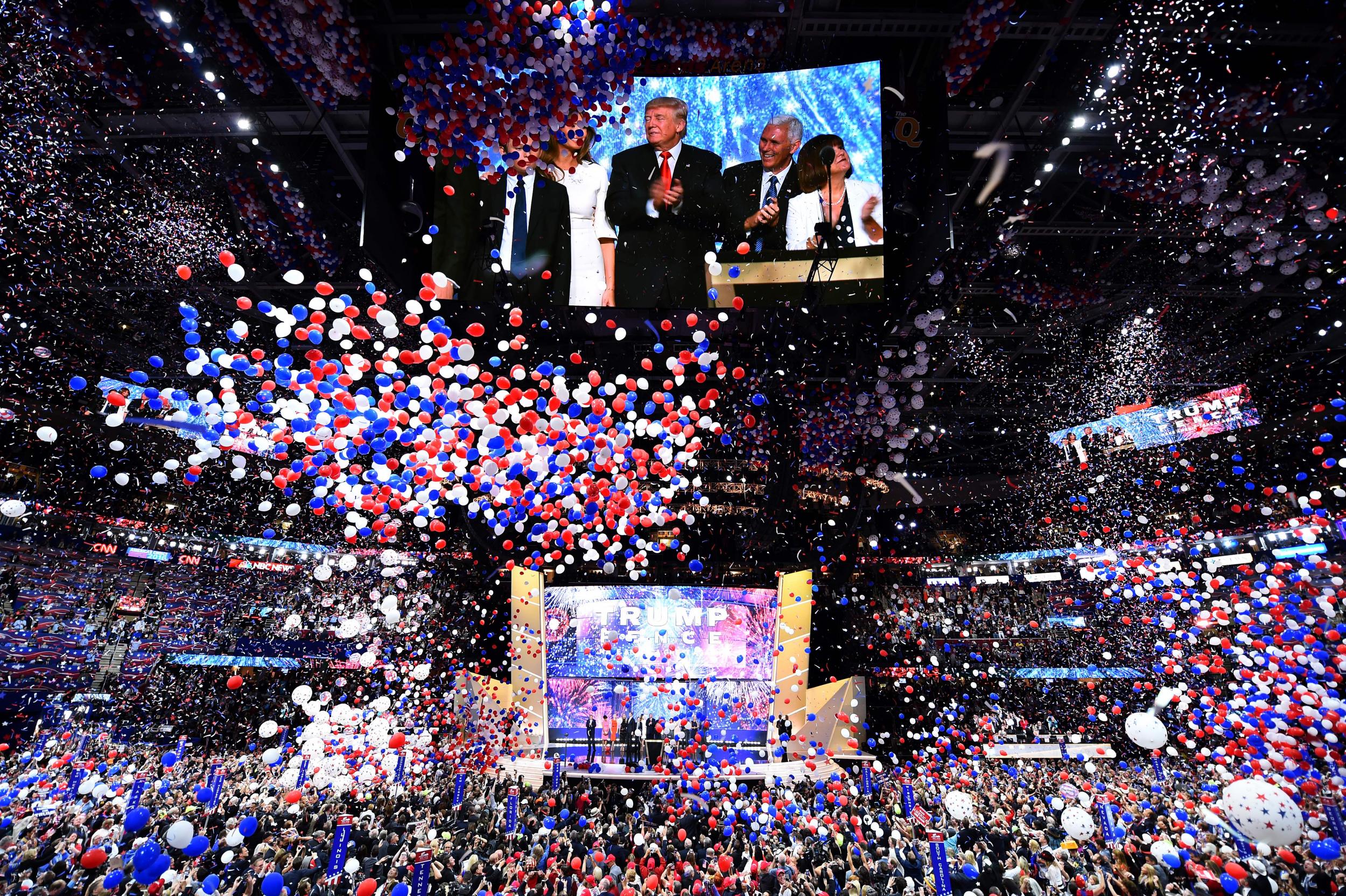Is Trump going to make everyone ill by forcing them to attend the Republican convention?
President wants people there in person but will that be safe, asks Andrew Buncombe


Few events in the political calendar better symbolise the drama and excitement of America’s presidential race, than the parties’ political conventions.
Held once every four years, typically in the summer before the November election, they are where the parties officially nominate their candidate, energise the grassroots and where their nominee makes an appeal to the nation. Often they are the location for soaring oratory against the backdrop of flags and banners and glitter; very occasionally, they can trigger protests and violence.
As with everything else, this year’s conventions have been impacted by the coronavirus pandemic that has shaken the world.
Democrats decided to push their event in Milwaukee, Wisconsin, back a month to the middle of August. Officials, along with the presumptive nominee Joe Biden, are discussing what portion of the convention, if any, will happen in person, rather than consisting of streamed events.
Republicans by contrast, are adamant their event in Charlotte, North Carolina, will be a traditional, in-person convention, where the president will launch the final months of his campaign for reelection. Furthermore, they are adamant that even while around 100,000 Americans have already died form the coronavirus, the event at the Spectrum Centre sports stadium will not add to that toll.
“I’m a traditionalist, but we’ll have to see, like everything else, but I think we’ll be in good shape by that time,” Trump last week told The Washington Examiner.
At the age of 73, Trump is in the age group considered most vulnerable to the disease. He also refuses to wear a mask in public, despite his own government’s advice.
Desperate for the country to end its lockdown as quickly as possible to kickstart the economy and better help his election chances, he appears to believe having a virtual event would be too much of an admission of the ongoing scale of the pandemic.
As with many decisions in the US, the final say on whether an event of that size can proceed sits with the governor of the state. While Trump won North Carolina 50 – 46 in the 2016, the governor, Roy Cooper, is a Democrat. So too, is the mayor of Charlotte, Vi Lyles.
In recent days, as Cooper and Lyles have highlighted concerns about holding such an event, Trump has accused them of playing politics. He has even threatened to relocate the event to Florida, though denied suggestions he wished to hold it at one of his own resorts.
“I love the Great State of North Carolina, so much so that I insisted on having the Republican National Convention in Charlotte at the end of August,” he tweeted on Monday. “Unfortunately, Democrat Governor, @RoyCooperNC is still in Shutdown mood & unable to guarantee.”
He added: “[We] must be immediately given an answer by the Governor as to whether or not the space will be allowed to be fully occupied. If not, we will be reluctantly forced to find, with all of the jobs and economic development it brings, another Republican National Convention site.”
Cooper last week told CNN the decision on whether the event went ahead needed to be made based on best science.
“This is not political. This is not emotional. This is based on health experts, data and science and that’s it for everybody to see,” he said.
In response to Trump’s Memorial Day tweets, he said: “State health officials are working with the Republican National Committee and will review its plans as they make decisions about how to hold the convention in Charlotte. North Carolina is relying on data and science to protect our state’s public health and safety.”
According to the New York Times, Ronna McDaniel, chairwoman of the Republican National Convention, told reporters this week the party was pushing ahead with plans for an in-person event, while leaving open the option to pivot. “It’s quite a ways away, and there’s ample time for us to adjust, if necessary.”
Democrats have their own problems. The decision to hold their conventions in Wisconsin, the state whose capture on election night in November 2016 gave Trump the necessary number of electoral college votes to secure the White House, is weighted with significance. Along with places such as Michigan and Pennsylvania, it is one of the states at the top of their lists of target regain.
Yet for all the polls suggesting Biden is polling well against Trump in many battleground states, Democrats know this will be a tough battle. With Biden – never the most dynamic performer – confined to live-steaming campaign messages from his home in Delaware, they have watched with anxiety Trump use White House press conferences to deliver aggressive attacks, intended to diminish his opponent and fire up his base. They are concerned that without the likes of Barack and Michelle Obama, or Bernie Sanders, raising the roof of the convention to unite and inspire their own supporters, there will be a question of whether Biden will have what it takes to win.
Democrats have also engaged in their political point scoring. Earlier this month the Washington Post reported that the RNC had asked the federal government for personal protective equipment (PPE), for attendees of both conventions. The Democrats spokesperson, Xochitl Hinojosa, tweeted: “We should be focused on getting PPE to health care works right now, not political operatives.”
Even if Trump forces his supporters to attend in person, some veteran political observers question whether delegates, politicians and the media will be willing to attend either event.
“Would you want to go without there being a vaccine for this thing,” Democratic strategist Michael Fraioli told The Independent. “I know I wouldn’t.”
Join our commenting forum
Join thought-provoking conversations, follow other Independent readers and see their replies
Comments